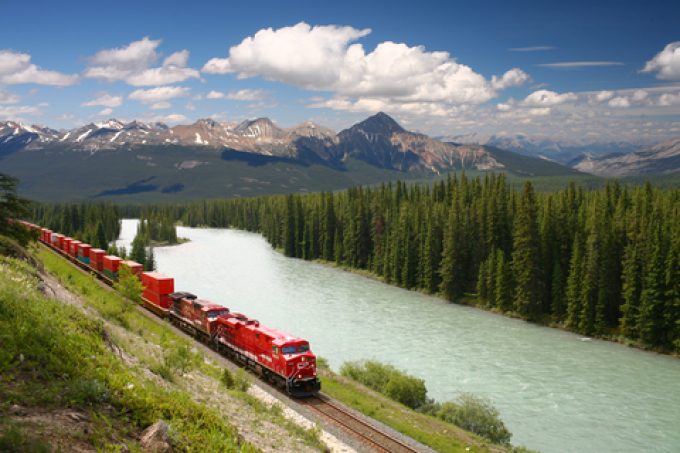RTR: Maersk sees global trade growth rising as much as 7% in 2025, exec says
REUTERS reports: Maersk expects global trade growth rising as much as 7% next year, bolstered by ...
FDX: ABOUT USPS PRIVATISATIONFDX: CCO VIEWFDX: LOWER GUIDANCE FDX: DISRUPTING AIR FREIGHTFDX: FOCUS ON KEY VERTICALFDX: LTL OUTLOOKGXO: NEW LOW LINE: NEW LOW FDX: INDUSTRIAL WOESFDX: HEALTH CHECKFDX: TRADING UPDATEWMT: GREEN WOESFDX: FREIGHT BREAK-UPFDX: WAITING FOR THE SPINHON: BREAK-UP ALLUREDSV: BREACHING SUPPORTVW: BOLT-ON DEALAMZN: TOP PICK
FDX: ABOUT USPS PRIVATISATIONFDX: CCO VIEWFDX: LOWER GUIDANCE FDX: DISRUPTING AIR FREIGHTFDX: FOCUS ON KEY VERTICALFDX: LTL OUTLOOKGXO: NEW LOW LINE: NEW LOW FDX: INDUSTRIAL WOESFDX: HEALTH CHECKFDX: TRADING UPDATEWMT: GREEN WOESFDX: FREIGHT BREAK-UPFDX: WAITING FOR THE SPINHON: BREAK-UP ALLUREDSV: BREACHING SUPPORTVW: BOLT-ON DEALAMZN: TOP PICK

Large shippers are keeping inventory high, fearing a Canadian rail strike could come sooner than expected and would likely be an ‘all or nothing scenario’.
Rail operators Canadian National (CN) and Canadian Pacific Kansas City (CPKC) have both suggested continuation of only ‘essential services’ would be more damaging than a complete shutdown.
Workers at CN and CPKC were to strike on 22 May, but a request from the government for the Canada Industrial Relations Board (CIRB) to “review if a strike could endanger public safety” put this on pause.
But the Teamsters National Rail Conference (TCRC) union has vowed to strike at the earliest opportunity after the CIRB ruling, and there have been no negotiations in the meantime.
On 27 May, the CIRB reviewed submissions from CN, CPKC, the TCRC and other affected organisations. Concerns raised included those related to commercial or economic interests, global food security, impact on the supply of diesel or propane and the immediate impact on the supply of water treatment materials for several municipalities.
The board also said it had received requests for advanced notice of its decision, or that the notice period required before a strike, currently 72 hours, be extended.
The Canadian International Forwarders Association argued 72 hours was “insufficient”, as supply chains need 30 days or more to prepare for work stoppages. CN and CPKC also requested a 30-day ‘cooling-off’ period.
The CIRB has now directed stakeholders to provide final replies by 14 June, which could mean a CIRB decision, and possibly a strike, by the end of the month.
CN, CPKC and TCRC argue that rail services should not be deemed essential and recalled a previous dispute between CN and TCRC where the same conclusion was reached.
“The employers have agreed with TCRC in the past that there are no such essential services,” said the union. And CPKC added: “It is not clear why the conclusions reached by the board in the CN decision would be any different today.”
The rail operators also argued against a partial continuation of only deemed ‘essential services’, namely propane, and called for an ‘all-or-nothing’ approach.
“CN states that in any event, work stoppage for strike or lockout would not cause an immediate and serious danger to the safety or health of the public.
“In the alternative… CN submits that an order to continue work must apply to its entire operation and not be restricted to transporting certain commodities. Should these circumstances arise.”
CPKC agreed: “Should the board determine that CPKC must continue to transport any goods during a work stoppage, the only way for CPKC to comply would be for it continue to operate its entire Canadian rail network.”
This is due to network configuration making it difficult to only operate certain commodities on certain routes. Challenges cited were the movement of parked carriages off tracks, which would lead to congested railyards and an increase in the likelihood of collisions and derailment.
One major shipper told The Loadstar: “We are trying to be cautious that a strike could happen prior to July and aiming to keep inventory levels on the high side.”
And, in the event of a strike, “trucking is the main mitigation strategy, as well as moving inventory to external warehouses in the US and filling our own plants up”.
Maersk has said it would offer inducement calls to the Seattle-Tacoma Northwest Seaport Alliance on four sailings of its TP1 service to manage US import and export rail cargo, rather than having it dispatched in Vancouver and transported cross-border to the US.
But this has led to concern that cargo diverted to Tacoma would cause significant bottlenecks across US rail networks already struggling with their own staffing and congestion issues.
Meanwhile, the chance of disruption to cargo flows in and out of Canada went up a notch last week, when customs and immigration agents voted to strike over their contract negotiations with the Canada Border Services Agency.
“I haven’t seen such a possibility of chaos ever – such a bundling of negative logistics scenarios,” said Karl-Heinz Legler, general manager of Rutherford Global Logistics.
“Big companies that have the ways and means will get their cargo; small and mid-sized companies will suffer,” he said.
Listen to this clip from The Loadstar Podcast to hear about how DP World is using rail in its Modal Shift Programme to cut emissions:
Comment on this article